HBCA (CACHE Level 3) Unit 1 LO4: Equality, Diversity & Inclusion Plan
VerifiedAdded on 2022/12/28
|17
|3837
|41
Homework Assignment
AI Summary
This assignment solution addresses Unit 1, Learning Outcome 4 of the Home Based Childcare Award (HBCA), focusing on understanding and promoting equality, diversity, and inclusion in childcare settings. The solution fulfills assessment criteria 4.1 and 4.2, explaining the roles and responsibilities of a home-based childcarer in supporting equality, diversity, and inclusive practices, including meeting legal requirements under the Equality Act 2010 and EYFS, supporting British Values, being culturally aware, keeping up to date with legislation, reflecting diversity in resources, avoiding stereotypical comments, and challenging discrimination. The solution also evaluates the impact of the childcarer's own attitudes, values, and behaviors in supporting equality, diversity, and inclusive practice, providing examples related to caring for a disabled child, a child whose home language is not English, and a child from a different race. Additionally, the assignment includes Unit 1, Learning Outcome 5, discussing children’s well-being in relation to current frameworks and the EYFS, and planning to meet the needs of children aged 0-7 and 7+ regarding diet, personal care, rest, and hygiene, along with strategies to encourage healthy eating and reasons for special dietary requirements.
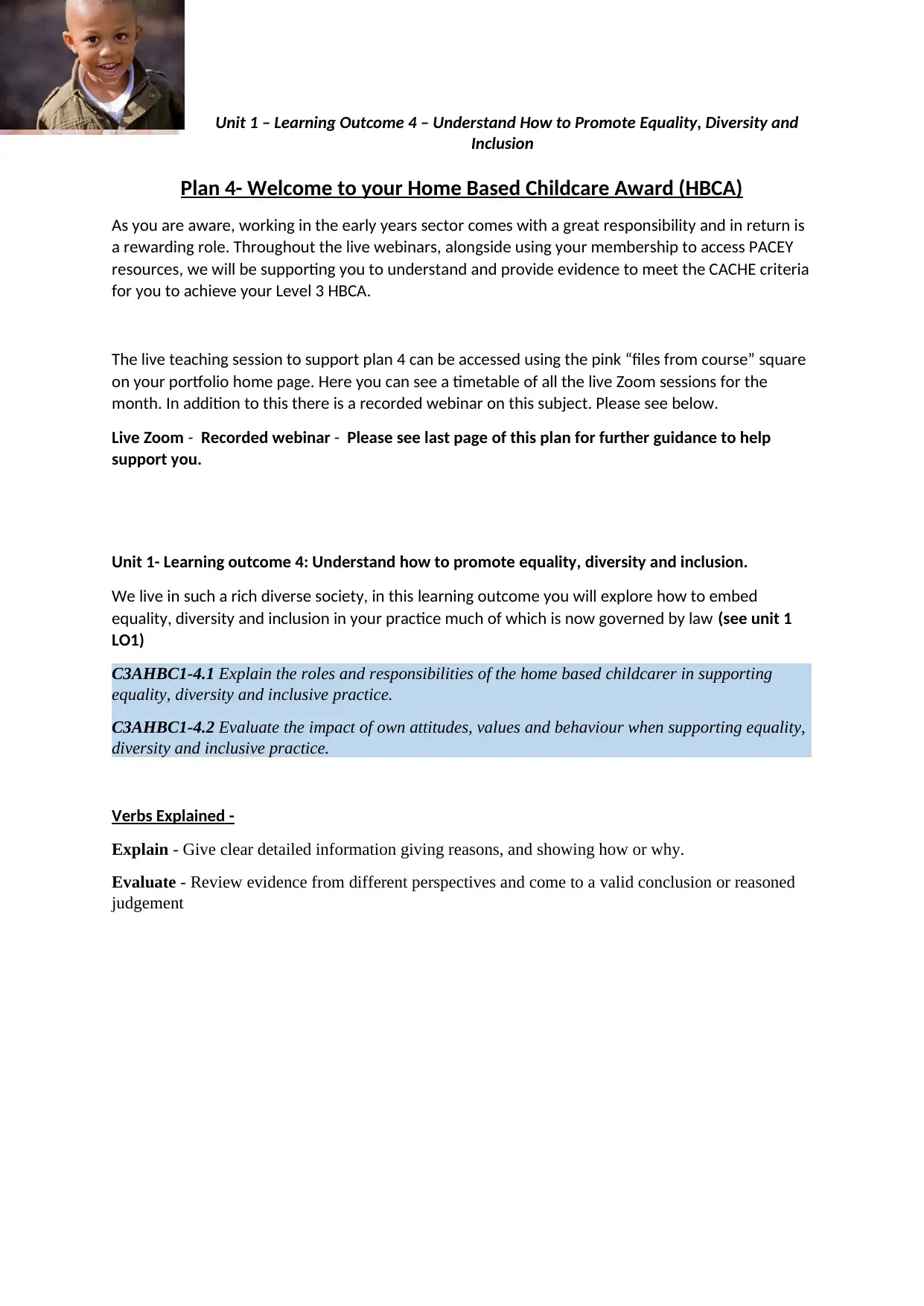
Unit 1 – Learning Outcome 4 – Understand How to Promote Equality, Diversity and
Inclusion
Plan 4- Welcome to your Home Based Childcare Award (HBCA)
As you are aware, working in the early years sector comes with a great responsibility and in return is
a rewarding role. Throughout the live webinars, alongside using your membership to access PACEY
resources, we will be supporting you to understand and provide evidence to meet the CACHE criteria
for you to achieve your Level 3 HBCA.
The live teaching session to support plan 4 can be accessed using the pink “files from course” square
on your portfolio home page. Here you can see a timetable of all the live Zoom sessions for the
month. In addition to this there is a recorded webinar on this subject. Please see below.
Live Zoom - Recorded webinar - Please see last page of this plan for further guidance to help
support you.
Unit 1- Learning outcome 4: Understand how to promote equality, diversity and inclusion.
We live in such a rich diverse society, in this learning outcome you will explore how to embed
equality, diversity and inclusion in your practice much of which is now governed by law (see unit 1
LO1)
C3AHBC1-4.1 Explain the roles and responsibilities of the home based childcarer in supporting
equality, diversity and inclusive practice.
C3AHBC1-4.2 Evaluate the impact of own attitudes, values and behaviour when supporting equality,
diversity and inclusive practice.
Verbs Explained -
Explain - Give clear detailed information giving reasons, and showing how or why.
Evaluate - Review evidence from different perspectives and come to a valid conclusion or reasoned
judgement
Inclusion
Plan 4- Welcome to your Home Based Childcare Award (HBCA)
As you are aware, working in the early years sector comes with a great responsibility and in return is
a rewarding role. Throughout the live webinars, alongside using your membership to access PACEY
resources, we will be supporting you to understand and provide evidence to meet the CACHE criteria
for you to achieve your Level 3 HBCA.
The live teaching session to support plan 4 can be accessed using the pink “files from course” square
on your portfolio home page. Here you can see a timetable of all the live Zoom sessions for the
month. In addition to this there is a recorded webinar on this subject. Please see below.
Live Zoom - Recorded webinar - Please see last page of this plan for further guidance to help
support you.
Unit 1- Learning outcome 4: Understand how to promote equality, diversity and inclusion.
We live in such a rich diverse society, in this learning outcome you will explore how to embed
equality, diversity and inclusion in your practice much of which is now governed by law (see unit 1
LO1)
C3AHBC1-4.1 Explain the roles and responsibilities of the home based childcarer in supporting
equality, diversity and inclusive practice.
C3AHBC1-4.2 Evaluate the impact of own attitudes, values and behaviour when supporting equality,
diversity and inclusive practice.
Verbs Explained -
Explain - Give clear detailed information giving reasons, and showing how or why.
Evaluate - Review evidence from different perspectives and come to a valid conclusion or reasoned
judgement
Paraphrase This Document
Need a fresh take? Get an instant paraphrase of this document with our AI Paraphraser
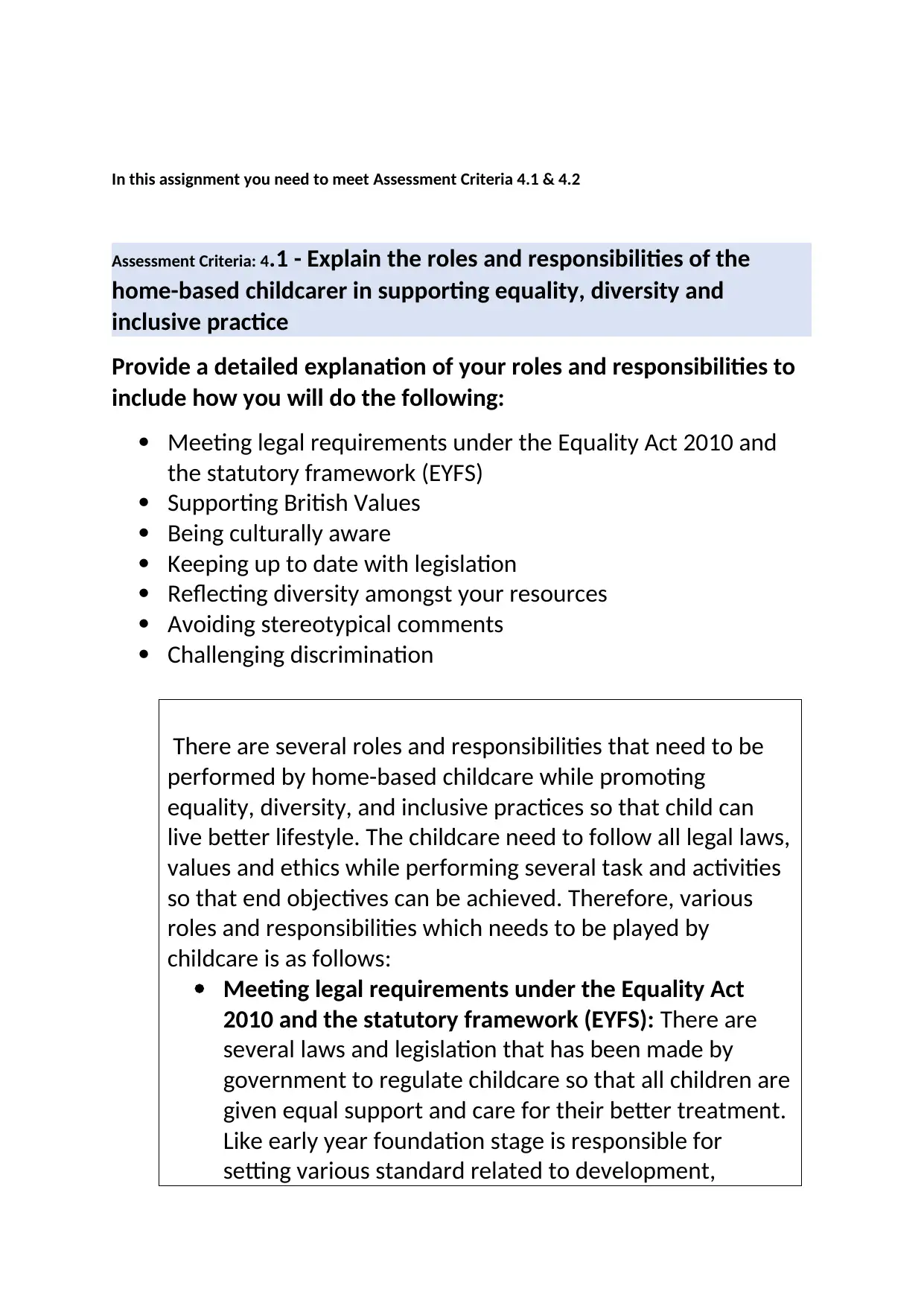
In this assignment you need to meet Assessment Criteria 4.1 & 4.2
Assessment Criteria: 4.1 - Explain the roles and responsibilities of the
home-based childcarer in supporting equality, diversity and
inclusive practice
Provide a detailed explanation of your roles and responsibilities to
include how you will do the following:
Meeting legal requirements under the Equality Act 2010 and
the statutory framework (EYFS)
Supporting British Values
Being culturally aware
Keeping up to date with legislation
Reflecting diversity amongst your resources
Avoiding stereotypical comments
Challenging discrimination
There are several roles and responsibilities that need to be
performed by home-based childcare while promoting
equality, diversity, and inclusive practices so that child can
live better lifestyle. The childcare need to follow all legal laws,
values and ethics while performing several task and activities
so that end objectives can be achieved. Therefore, various
roles and responsibilities which needs to be played by
childcare is as follows:
Meeting legal requirements under the Equality Act
2010 and the statutory framework (EYFS): There are
several laws and legislation that has been made by
government to regulate childcare so that all children are
given equal support and care for their better treatment.
Like early year foundation stage is responsible for
setting various standard related to development,
Assessment Criteria: 4.1 - Explain the roles and responsibilities of the
home-based childcarer in supporting equality, diversity and
inclusive practice
Provide a detailed explanation of your roles and responsibilities to
include how you will do the following:
Meeting legal requirements under the Equality Act 2010 and
the statutory framework (EYFS)
Supporting British Values
Being culturally aware
Keeping up to date with legislation
Reflecting diversity amongst your resources
Avoiding stereotypical comments
Challenging discrimination
There are several roles and responsibilities that need to be
performed by home-based childcare while promoting
equality, diversity, and inclusive practices so that child can
live better lifestyle. The childcare need to follow all legal laws,
values and ethics while performing several task and activities
so that end objectives can be achieved. Therefore, various
roles and responsibilities which needs to be played by
childcare is as follows:
Meeting legal requirements under the Equality Act
2010 and the statutory framework (EYFS): There are
several laws and legislation that has been made by
government to regulate childcare so that all children are
given equal support and care for their better treatment.
Like early year foundation stage is responsible for
setting various standard related to development,
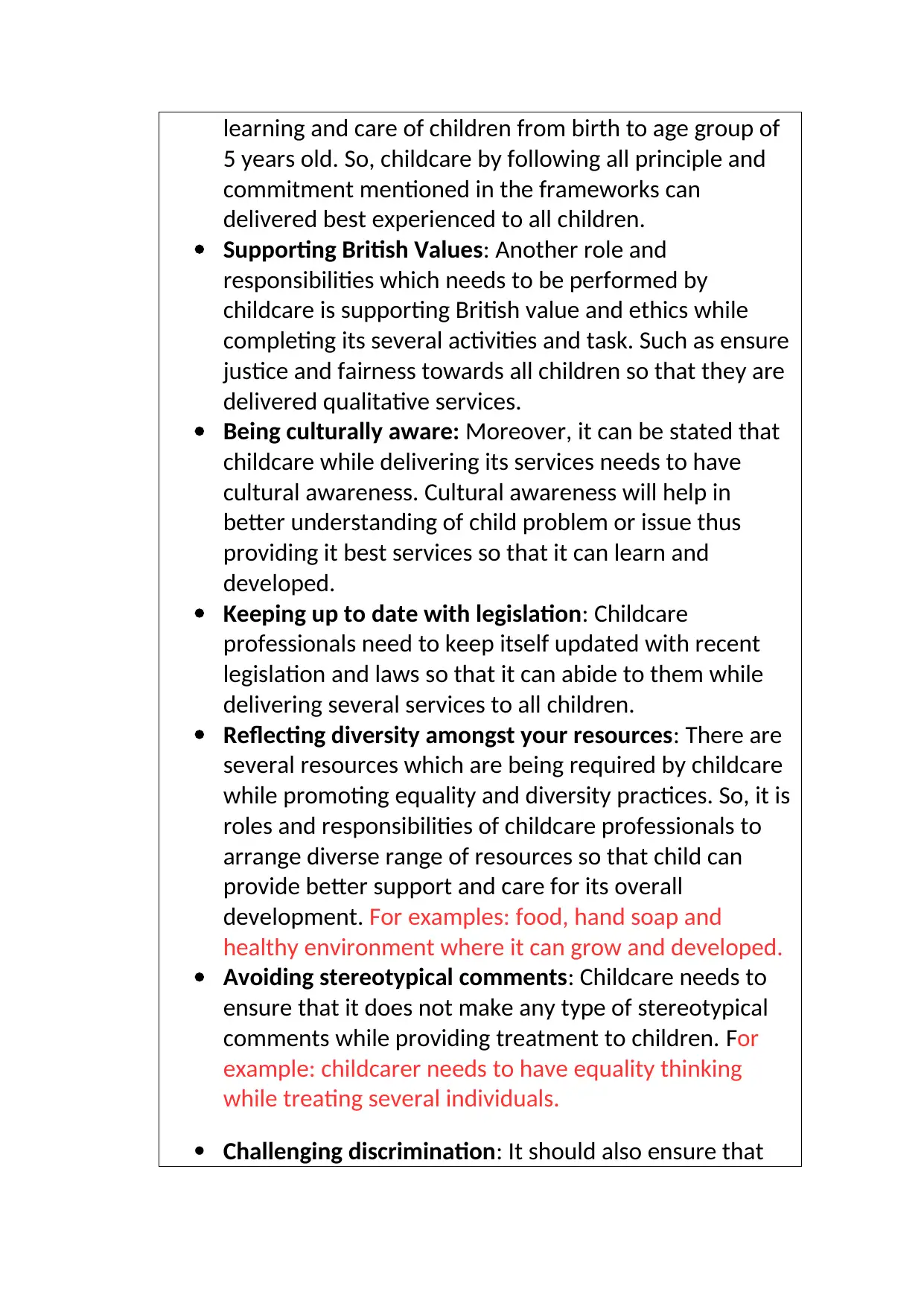
learning and care of children from birth to age group of
5 years old. So, childcare by following all principle and
commitment mentioned in the frameworks can
delivered best experienced to all children.
Supporting British Values: Another role and
responsibilities which needs to be performed by
childcare is supporting British value and ethics while
completing its several activities and task. Such as ensure
justice and fairness towards all children so that they are
delivered qualitative services.
Being culturally aware: Moreover, it can be stated that
childcare while delivering its services needs to have
cultural awareness. Cultural awareness will help in
better understanding of child problem or issue thus
providing it best services so that it can learn and
developed.
Keeping up to date with legislation: Childcare
professionals need to keep itself updated with recent
legislation and laws so that it can abide to them while
delivering several services to all children.
Reflecting diversity amongst your resources: There are
several resources which are being required by childcare
while promoting equality and diversity practices. So, it is
roles and responsibilities of childcare professionals to
arrange diverse range of resources so that child can
provide better support and care for its overall
development. For examples: food, hand soap and
healthy environment where it can grow and developed.
Avoiding stereotypical comments: Childcare needs to
ensure that it does not make any type of stereotypical
comments while providing treatment to children. For
example: childcarer needs to have equality thinking
while treating several individuals.
Challenging discrimination: It should also ensure that
5 years old. So, childcare by following all principle and
commitment mentioned in the frameworks can
delivered best experienced to all children.
Supporting British Values: Another role and
responsibilities which needs to be performed by
childcare is supporting British value and ethics while
completing its several activities and task. Such as ensure
justice and fairness towards all children so that they are
delivered qualitative services.
Being culturally aware: Moreover, it can be stated that
childcare while delivering its services needs to have
cultural awareness. Cultural awareness will help in
better understanding of child problem or issue thus
providing it best services so that it can learn and
developed.
Keeping up to date with legislation: Childcare
professionals need to keep itself updated with recent
legislation and laws so that it can abide to them while
delivering several services to all children.
Reflecting diversity amongst your resources: There are
several resources which are being required by childcare
while promoting equality and diversity practices. So, it is
roles and responsibilities of childcare professionals to
arrange diverse range of resources so that child can
provide better support and care for its overall
development. For examples: food, hand soap and
healthy environment where it can grow and developed.
Avoiding stereotypical comments: Childcare needs to
ensure that it does not make any type of stereotypical
comments while providing treatment to children. For
example: childcarer needs to have equality thinking
while treating several individuals.
Challenging discrimination: It should also ensure that
⊘ This is a preview!⊘
Do you want full access?
Subscribe today to unlock all pages.

Trusted by 1+ million students worldwide
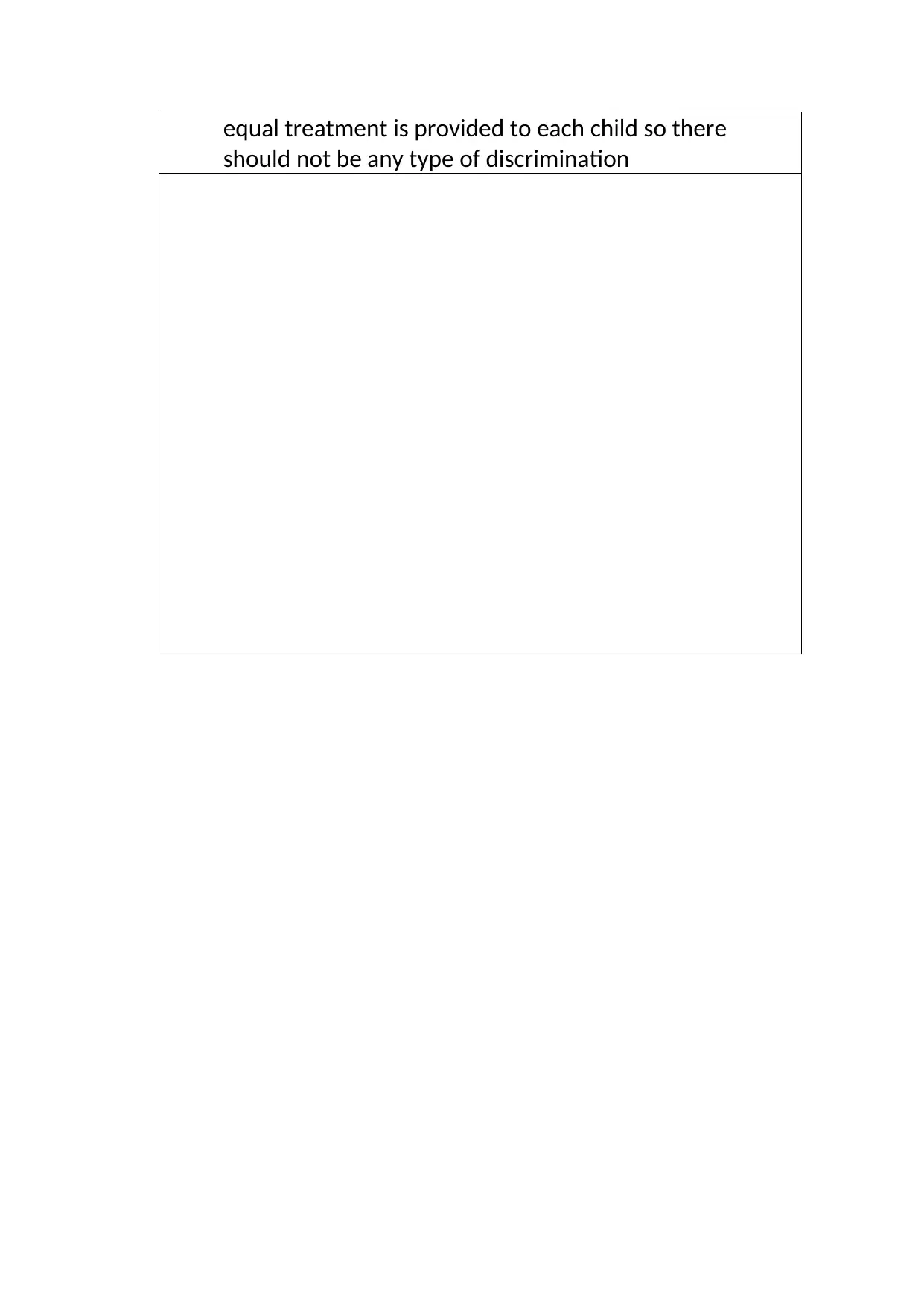
equal treatment is provided to each child so there
should not be any type of discrimination
should not be any type of discrimination
Paraphrase This Document
Need a fresh take? Get an instant paraphrase of this document with our AI Paraphraser
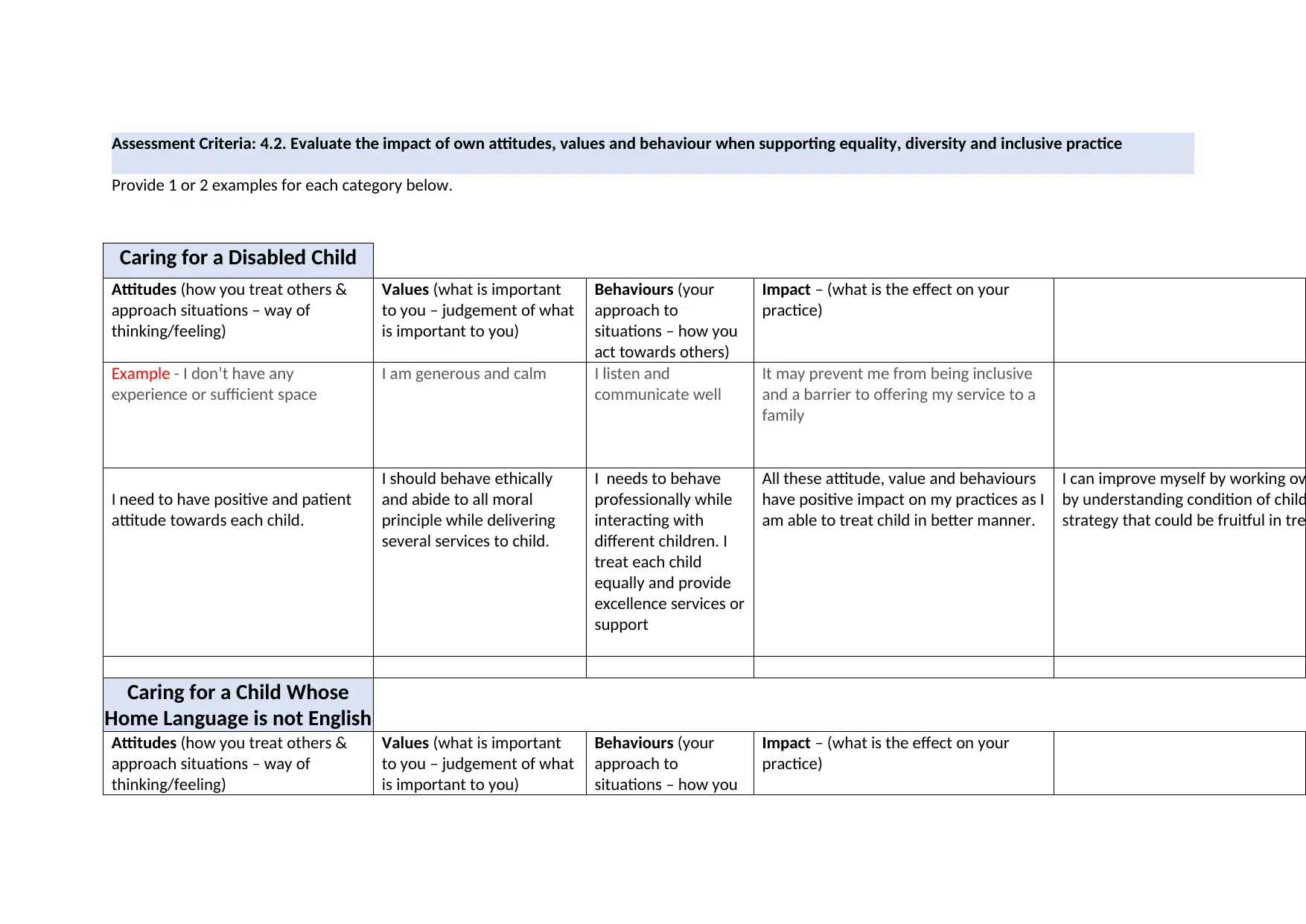
Assessment Criteria: 4.2. Evaluate the impact of own attitudes, values and behaviour when supporting equality, diversity and inclusive practice
Provide 1 or 2 examples for each category below.
Caring for a Disabled Child
Attitudes (how you treat others &
approach situations – way of
thinking/feeling)
Values (what is important
to you – judgement of what
is important to you)
Behaviours (your
approach to
situations – how you
act towards others)
Impact – (what is the effect on your
practice)
Example - I don’t have any
experience or sufficient space
I am generous and calm I listen and
communicate well
It may prevent me from being inclusive
and a barrier to offering my service to a
family
I need to have positive and patient
attitude towards each child.
I should behave ethically
and abide to all moral
principle while delivering
several services to child.
I needs to behave
professionally while
interacting with
different children. I
treat each child
equally and provide
excellence services or
support
All these attitude, value and behaviours
have positive impact on my practices as I
am able to treat child in better manner.
I can improve myself by working ov
by understanding condition of child
strategy that could be fruitful in trea
Caring for a Child Whose
Home Language is not English
Attitudes (how you treat others &
approach situations – way of
thinking/feeling)
Values (what is important
to you – judgement of what
is important to you)
Behaviours (your
approach to
situations – how you
Impact – (what is the effect on your
practice)
Provide 1 or 2 examples for each category below.
Caring for a Disabled Child
Attitudes (how you treat others &
approach situations – way of
thinking/feeling)
Values (what is important
to you – judgement of what
is important to you)
Behaviours (your
approach to
situations – how you
act towards others)
Impact – (what is the effect on your
practice)
Example - I don’t have any
experience or sufficient space
I am generous and calm I listen and
communicate well
It may prevent me from being inclusive
and a barrier to offering my service to a
family
I need to have positive and patient
attitude towards each child.
I should behave ethically
and abide to all moral
principle while delivering
several services to child.
I needs to behave
professionally while
interacting with
different children. I
treat each child
equally and provide
excellence services or
support
All these attitude, value and behaviours
have positive impact on my practices as I
am able to treat child in better manner.
I can improve myself by working ov
by understanding condition of child
strategy that could be fruitful in trea
Caring for a Child Whose
Home Language is not English
Attitudes (how you treat others &
approach situations – way of
thinking/feeling)
Values (what is important
to you – judgement of what
is important to you)
Behaviours (your
approach to
situations – how you
Impact – (what is the effect on your
practice)
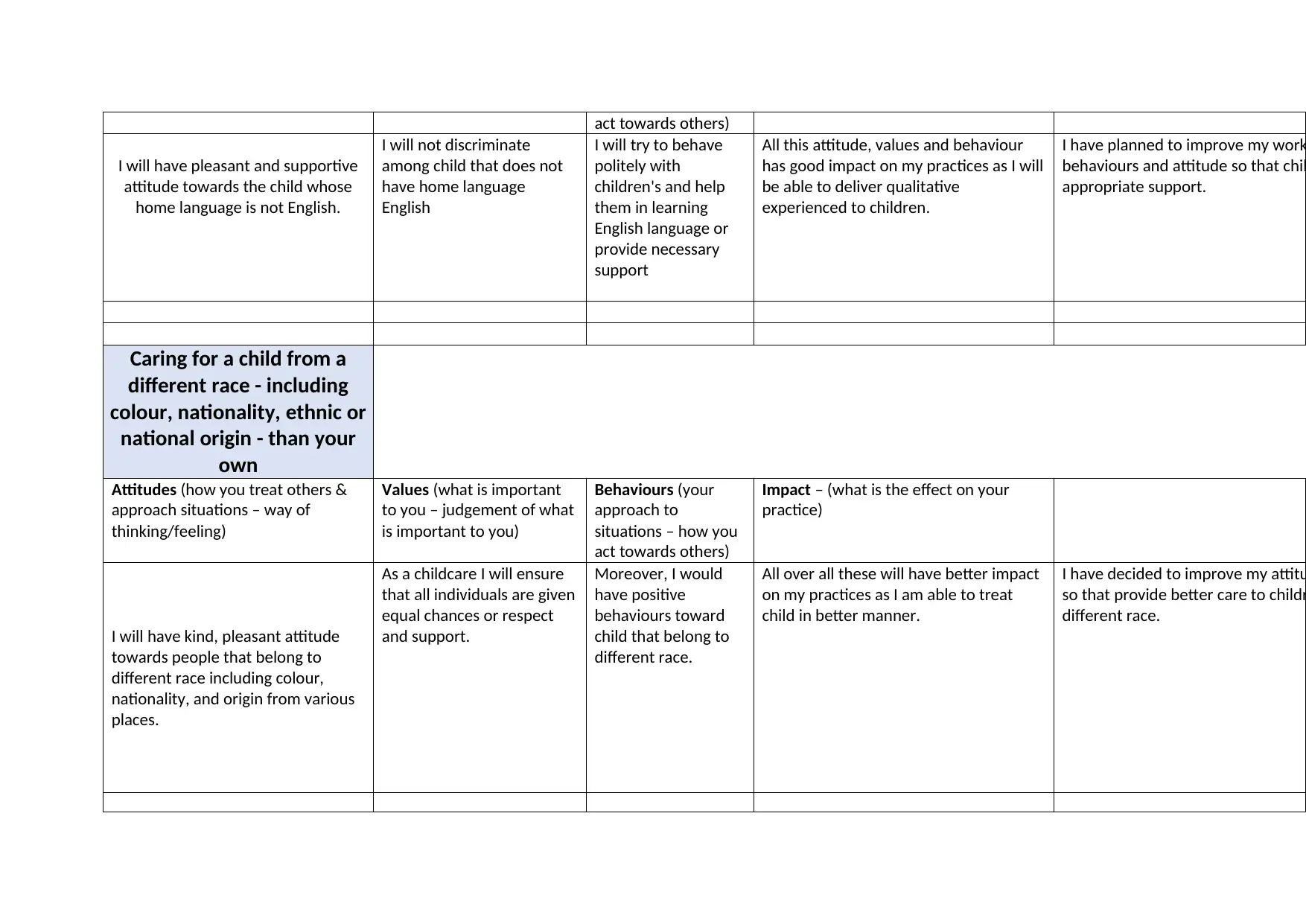
act towards others)
I will have pleasant and supportive
attitude towards the child whose
home language is not English.
I will not discriminate
among child that does not
have home language
English
I will try to behave
politely with
children's and help
them in learning
English language or
provide necessary
support
All this attitude, values and behaviour
has good impact on my practices as I will
be able to deliver qualitative
experienced to children.
I have planned to improve my work
behaviours and attitude so that chil
appropriate support.
Caring for a child from a
different race - including
colour, nationality, ethnic or
national origin - than your
own
Attitudes (how you treat others &
approach situations – way of
thinking/feeling)
Values (what is important
to you – judgement of what
is important to you)
Behaviours (your
approach to
situations – how you
act towards others)
Impact – (what is the effect on your
practice)
I will have kind, pleasant attitude
towards people that belong to
different race including colour,
nationality, and origin from various
places.
As a childcare I will ensure
that all individuals are given
equal chances or respect
and support.
Moreover, I would
have positive
behaviours toward
child that belong to
different race.
All over all these will have better impact
on my practices as I am able to treat
child in better manner.
I have decided to improve my attitu
so that provide better care to childr
different race.
I will have pleasant and supportive
attitude towards the child whose
home language is not English.
I will not discriminate
among child that does not
have home language
English
I will try to behave
politely with
children's and help
them in learning
English language or
provide necessary
support
All this attitude, values and behaviour
has good impact on my practices as I will
be able to deliver qualitative
experienced to children.
I have planned to improve my work
behaviours and attitude so that chil
appropriate support.
Caring for a child from a
different race - including
colour, nationality, ethnic or
national origin - than your
own
Attitudes (how you treat others &
approach situations – way of
thinking/feeling)
Values (what is important
to you – judgement of what
is important to you)
Behaviours (your
approach to
situations – how you
act towards others)
Impact – (what is the effect on your
practice)
I will have kind, pleasant attitude
towards people that belong to
different race including colour,
nationality, and origin from various
places.
As a childcare I will ensure
that all individuals are given
equal chances or respect
and support.
Moreover, I would
have positive
behaviours toward
child that belong to
different race.
All over all these will have better impact
on my practices as I am able to treat
child in better manner.
I have decided to improve my attitu
so that provide better care to childr
different race.
⊘ This is a preview!⊘
Do you want full access?
Subscribe today to unlock all pages.

Trusted by 1+ million students worldwide
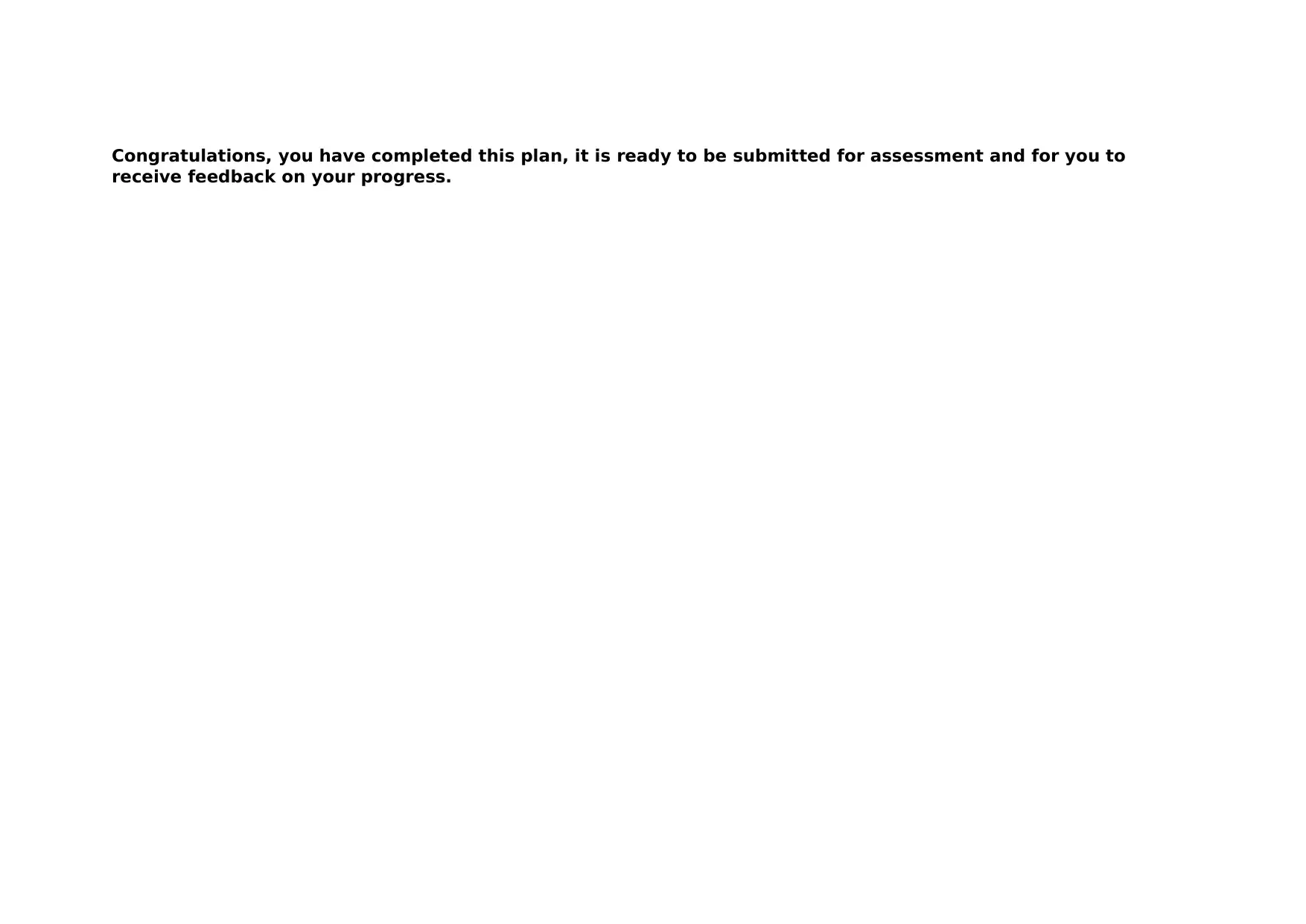
Congratulations, you have completed this plan, it is ready to be submitted for assessment and for you to
receive feedback on your progress.
receive feedback on your progress.
Paraphrase This Document
Need a fresh take? Get an instant paraphrase of this document with our AI Paraphraser
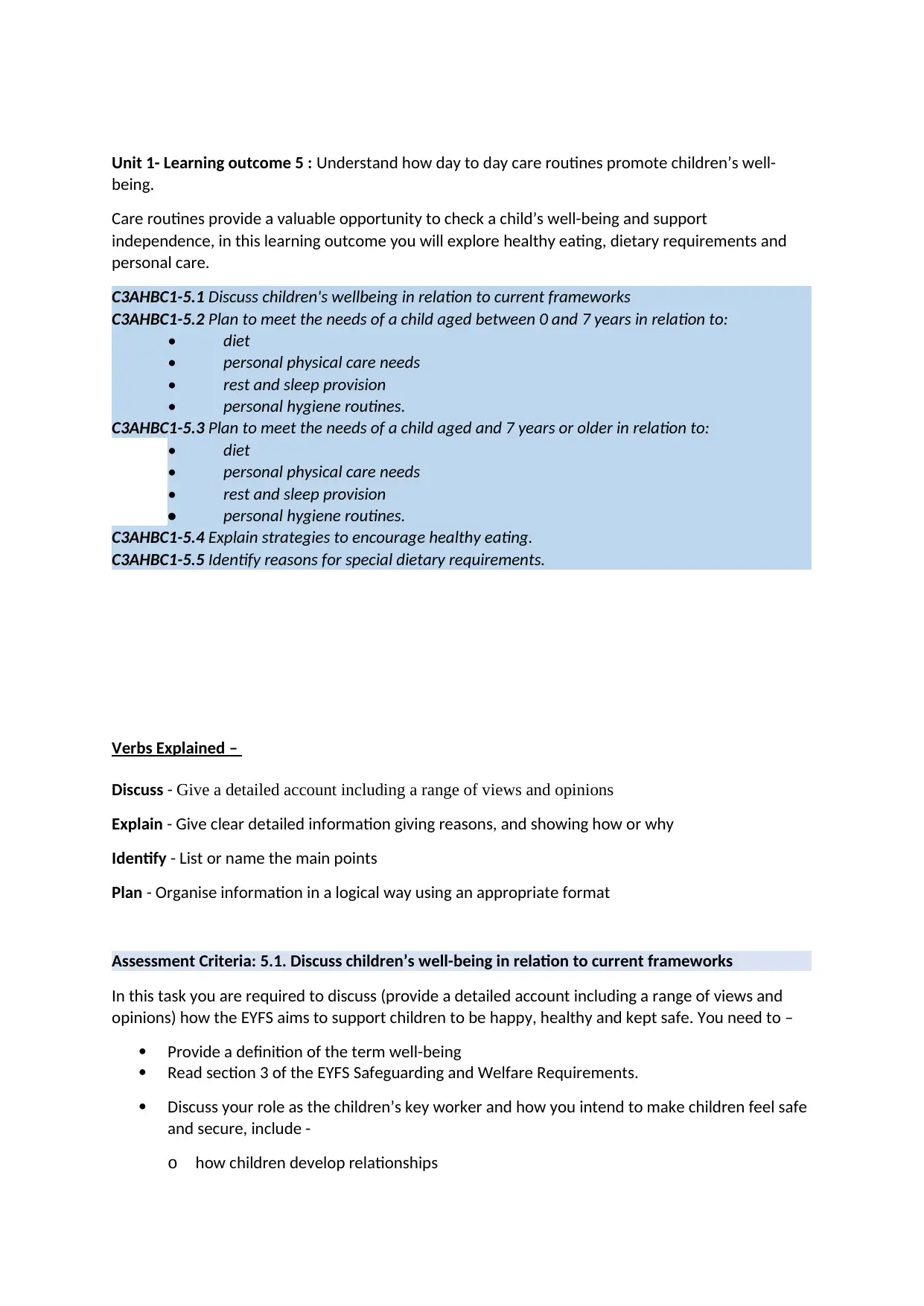
Unit 1- Learning outcome 5 : Understand how day to day care routines promote children’s well-
being.
Care routines provide a valuable opportunity to check a child’s well-being and support
independence, in this learning outcome you will explore healthy eating, dietary requirements and
personal care.
C3AHBC1-5.1 Discuss children's wellbeing in relation to current frameworks
C3AHBC1-5.2 Plan to meet the needs of a child aged between 0 and 7 years in relation to:
• diet
• personal physical care needs
• rest and sleep provision
• personal hygiene routines.
C3AHBC1-5.3 Plan to meet the needs of a child aged and 7 years or older in relation to:
• diet
• personal physical care needs
• rest and sleep provision
• personal hygiene routines.
C3AHBC1-5.4 Explain strategies to encourage healthy eating.
C3AHBC1-5.5 Identify reasons for special dietary requirements.
Verbs Explained –
Discuss - Give a detailed account including a range of views and opinions
Explain - Give clear detailed information giving reasons, and showing how or why
Identify - List or name the main points
Plan - Organise information in a logical way using an appropriate format
Assessment Criteria: 5.1. Discuss children’s well-being in relation to current frameworks
In this task you are required to discuss (provide a detailed account including a range of views and
opinions) how the EYFS aims to support children to be happy, healthy and kept safe. You need to –
Provide a definition of the term well-being
Read section 3 of the EYFS Safeguarding and Welfare Requirements.
Discuss your role as the children’s key worker and how you intend to make children feel safe
and secure, include -
o how children develop relationships
being.
Care routines provide a valuable opportunity to check a child’s well-being and support
independence, in this learning outcome you will explore healthy eating, dietary requirements and
personal care.
C3AHBC1-5.1 Discuss children's wellbeing in relation to current frameworks
C3AHBC1-5.2 Plan to meet the needs of a child aged between 0 and 7 years in relation to:
• diet
• personal physical care needs
• rest and sleep provision
• personal hygiene routines.
C3AHBC1-5.3 Plan to meet the needs of a child aged and 7 years or older in relation to:
• diet
• personal physical care needs
• rest and sleep provision
• personal hygiene routines.
C3AHBC1-5.4 Explain strategies to encourage healthy eating.
C3AHBC1-5.5 Identify reasons for special dietary requirements.
Verbs Explained –
Discuss - Give a detailed account including a range of views and opinions
Explain - Give clear detailed information giving reasons, and showing how or why
Identify - List or name the main points
Plan - Organise information in a logical way using an appropriate format
Assessment Criteria: 5.1. Discuss children’s well-being in relation to current frameworks
In this task you are required to discuss (provide a detailed account including a range of views and
opinions) how the EYFS aims to support children to be happy, healthy and kept safe. You need to –
Provide a definition of the term well-being
Read section 3 of the EYFS Safeguarding and Welfare Requirements.
Discuss your role as the children’s key worker and how you intend to make children feel safe
and secure, include -
o how children develop relationships
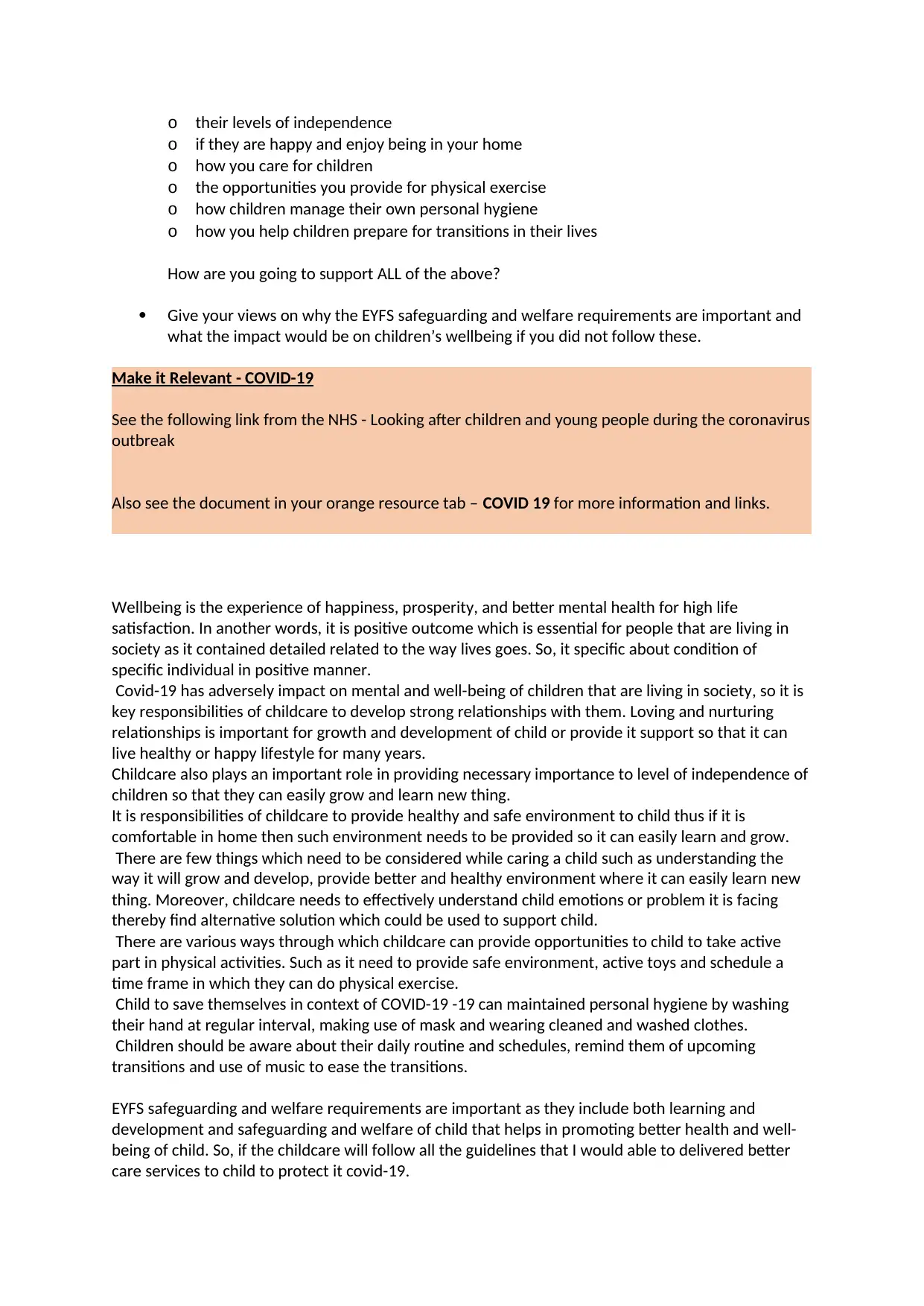
o their levels of independence
o if they are happy and enjoy being in your home
o how you care for children
o the opportunities you provide for physical exercise
o how children manage their own personal hygiene
o how you help children prepare for transitions in their lives
How are you going to support ALL of the above?
Give your views on why the EYFS safeguarding and welfare requirements are important and
what the impact would be on children’s wellbeing if you did not follow these.
Make it Relevant - COVID-19
See the following link from the NHS - Looking after children and young people during the coronavirus
outbreak
Also see the document in your orange resource tab – COVID 19 for more information and links.
Wellbeing is the experience of happiness, prosperity, and better mental health for high life
satisfaction. In another words, it is positive outcome which is essential for people that are living in
society as it contained detailed related to the way lives goes. So, it specific about condition of
specific individual in positive manner.
Covid-19 has adversely impact on mental and well-being of children that are living in society, so it is
key responsibilities of childcare to develop strong relationships with them. Loving and nurturing
relationships is important for growth and development of child or provide it support so that it can
live healthy or happy lifestyle for many years.
Childcare also plays an important role in providing necessary importance to level of independence of
children so that they can easily grow and learn new thing.
It is responsibilities of childcare to provide healthy and safe environment to child thus if it is
comfortable in home then such environment needs to be provided so it can easily learn and grow.
There are few things which need to be considered while caring a child such as understanding the
way it will grow and develop, provide better and healthy environment where it can easily learn new
thing. Moreover, childcare needs to effectively understand child emotions or problem it is facing
thereby find alternative solution which could be used to support child.
There are various ways through which childcare can provide opportunities to child to take active
part in physical activities. Such as it need to provide safe environment, active toys and schedule a
time frame in which they can do physical exercise.
Child to save themselves in context of COVID-19 -19 can maintained personal hygiene by washing
their hand at regular interval, making use of mask and wearing cleaned and washed clothes.
Children should be aware about their daily routine and schedules, remind them of upcoming
transitions and use of music to ease the transitions.
EYFS safeguarding and welfare requirements are important as they include both learning and
development and safeguarding and welfare of child that helps in promoting better health and well-
being of child. So, if the childcare will follow all the guidelines that I would able to delivered better
care services to child to protect it covid-19.
o if they are happy and enjoy being in your home
o how you care for children
o the opportunities you provide for physical exercise
o how children manage their own personal hygiene
o how you help children prepare for transitions in their lives
How are you going to support ALL of the above?
Give your views on why the EYFS safeguarding and welfare requirements are important and
what the impact would be on children’s wellbeing if you did not follow these.
Make it Relevant - COVID-19
See the following link from the NHS - Looking after children and young people during the coronavirus
outbreak
Also see the document in your orange resource tab – COVID 19 for more information and links.
Wellbeing is the experience of happiness, prosperity, and better mental health for high life
satisfaction. In another words, it is positive outcome which is essential for people that are living in
society as it contained detailed related to the way lives goes. So, it specific about condition of
specific individual in positive manner.
Covid-19 has adversely impact on mental and well-being of children that are living in society, so it is
key responsibilities of childcare to develop strong relationships with them. Loving and nurturing
relationships is important for growth and development of child or provide it support so that it can
live healthy or happy lifestyle for many years.
Childcare also plays an important role in providing necessary importance to level of independence of
children so that they can easily grow and learn new thing.
It is responsibilities of childcare to provide healthy and safe environment to child thus if it is
comfortable in home then such environment needs to be provided so it can easily learn and grow.
There are few things which need to be considered while caring a child such as understanding the
way it will grow and develop, provide better and healthy environment where it can easily learn new
thing. Moreover, childcare needs to effectively understand child emotions or problem it is facing
thereby find alternative solution which could be used to support child.
There are various ways through which childcare can provide opportunities to child to take active
part in physical activities. Such as it need to provide safe environment, active toys and schedule a
time frame in which they can do physical exercise.
Child to save themselves in context of COVID-19 -19 can maintained personal hygiene by washing
their hand at regular interval, making use of mask and wearing cleaned and washed clothes.
Children should be aware about their daily routine and schedules, remind them of upcoming
transitions and use of music to ease the transitions.
EYFS safeguarding and welfare requirements are important as they include both learning and
development and safeguarding and welfare of child that helps in promoting better health and well-
being of child. So, if the childcare will follow all the guidelines that I would able to delivered better
care services to child to protect it covid-19.
⊘ This is a preview!⊘
Do you want full access?
Subscribe today to unlock all pages.

Trusted by 1+ million students worldwide
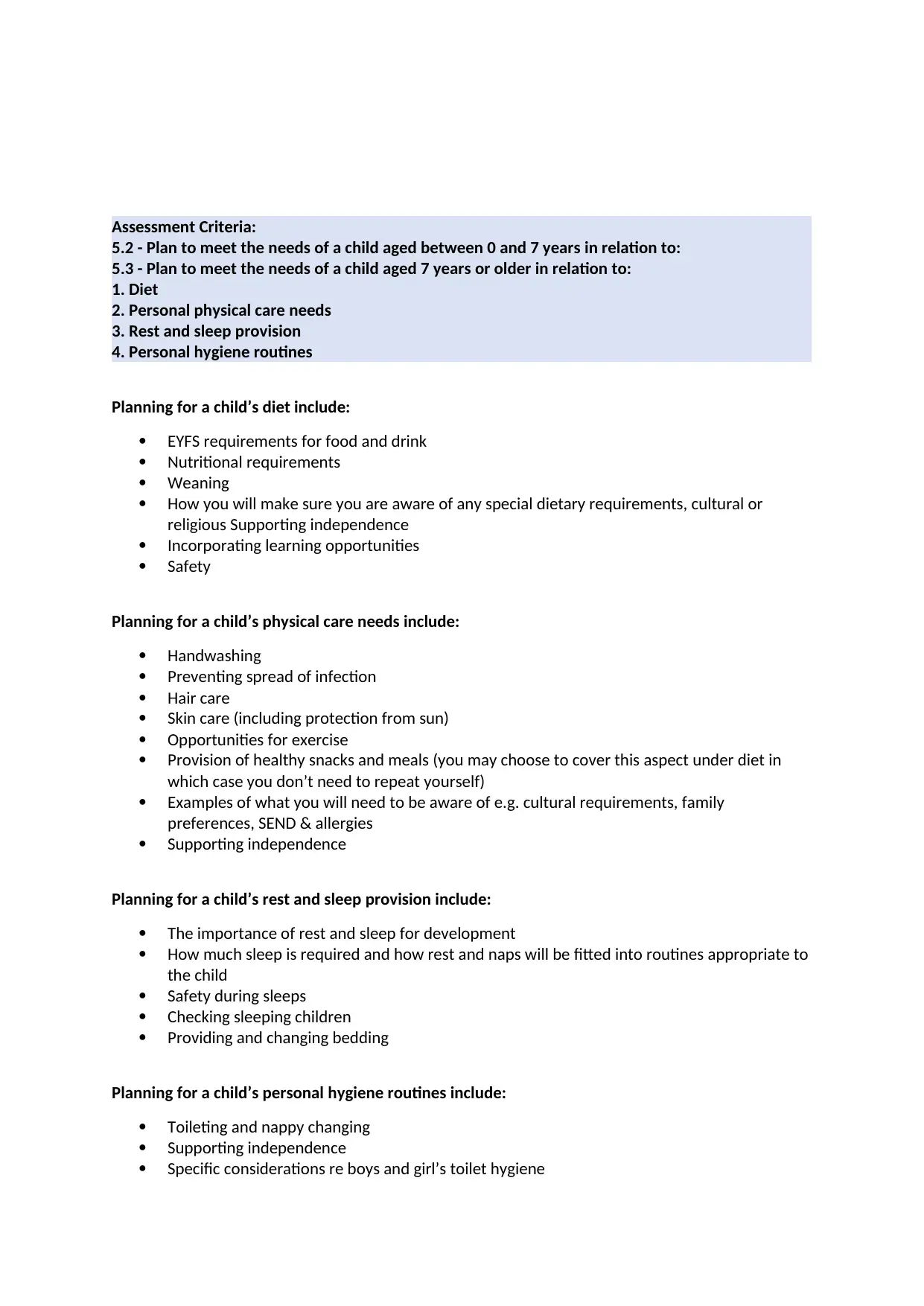
Assessment Criteria:
5.2 - Plan to meet the needs of a child aged between 0 and 7 years in relation to:
5.3 - Plan to meet the needs of a child aged 7 years or older in relation to:
1. Diet
2. Personal physical care needs
3. Rest and sleep provision
4. Personal hygiene routines
Planning for a child’s diet include:
EYFS requirements for food and drink
Nutritional requirements
Weaning
How you will make sure you are aware of any special dietary requirements, cultural or
religious Supporting independence
Incorporating learning opportunities
Safety
Planning for a child’s physical care needs include:
Handwashing
Preventing spread of infection
Hair care
Skin care (including protection from sun)
Opportunities for exercise
Provision of healthy snacks and meals (you may choose to cover this aspect under diet in
which case you don’t need to repeat yourself)
Examples of what you will need to be aware of e.g. cultural requirements, family
preferences, SEND & allergies
Supporting independence
Planning for a child’s rest and sleep provision include:
The importance of rest and sleep for development
How much sleep is required and how rest and naps will be fitted into routines appropriate to
the child
Safety during sleeps
Checking sleeping children
Providing and changing bedding
Planning for a child’s personal hygiene routines include:
Toileting and nappy changing
Supporting independence
Specific considerations re boys and girl’s toilet hygiene
5.2 - Plan to meet the needs of a child aged between 0 and 7 years in relation to:
5.3 - Plan to meet the needs of a child aged 7 years or older in relation to:
1. Diet
2. Personal physical care needs
3. Rest and sleep provision
4. Personal hygiene routines
Planning for a child’s diet include:
EYFS requirements for food and drink
Nutritional requirements
Weaning
How you will make sure you are aware of any special dietary requirements, cultural or
religious Supporting independence
Incorporating learning opportunities
Safety
Planning for a child’s physical care needs include:
Handwashing
Preventing spread of infection
Hair care
Skin care (including protection from sun)
Opportunities for exercise
Provision of healthy snacks and meals (you may choose to cover this aspect under diet in
which case you don’t need to repeat yourself)
Examples of what you will need to be aware of e.g. cultural requirements, family
preferences, SEND & allergies
Supporting independence
Planning for a child’s rest and sleep provision include:
The importance of rest and sleep for development
How much sleep is required and how rest and naps will be fitted into routines appropriate to
the child
Safety during sleeps
Checking sleeping children
Providing and changing bedding
Planning for a child’s personal hygiene routines include:
Toileting and nappy changing
Supporting independence
Specific considerations re boys and girl’s toilet hygiene
Paraphrase This Document
Need a fresh take? Get an instant paraphrase of this document with our AI Paraphraser
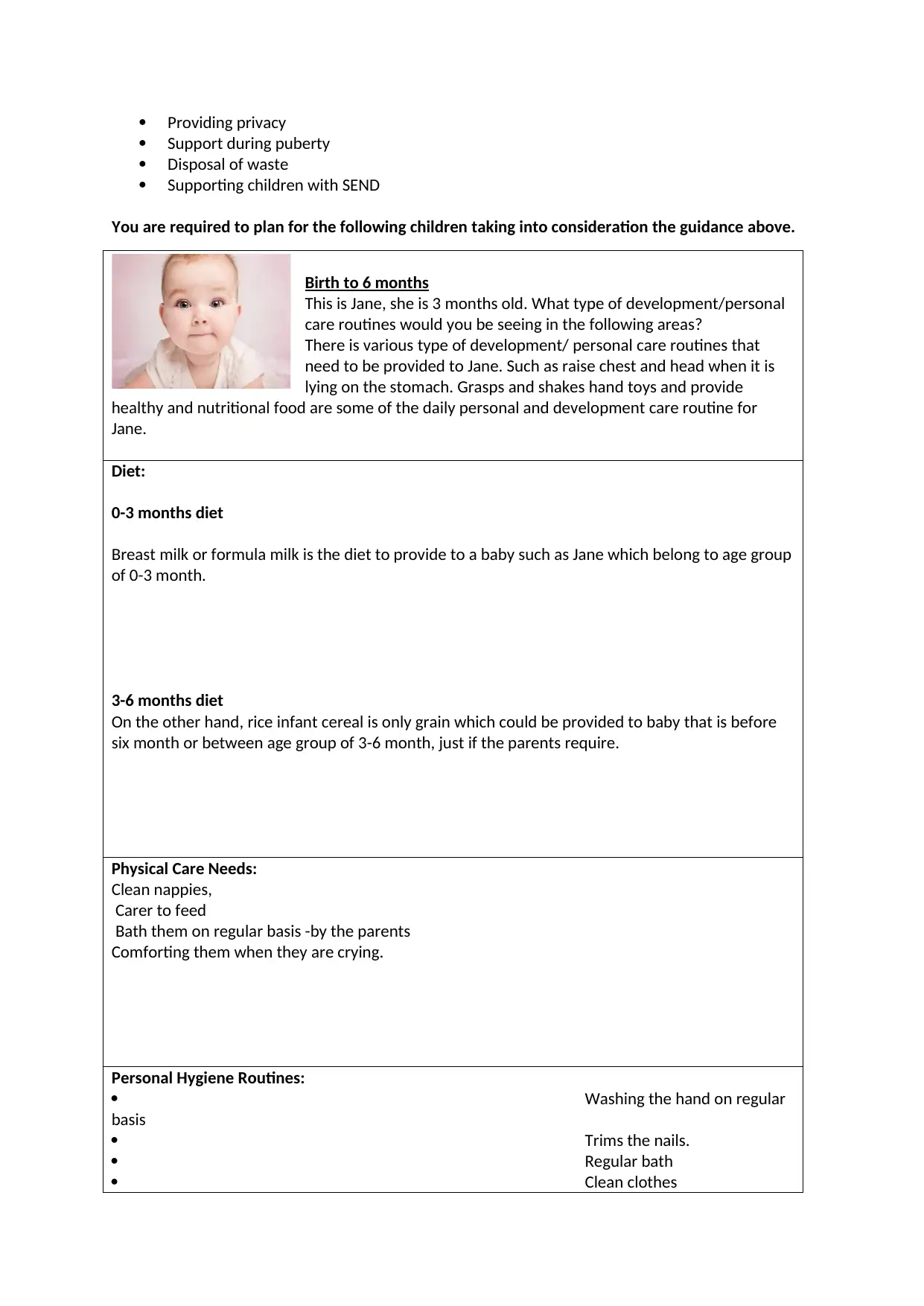
Providing privacy
Support during puberty
Disposal of waste
Supporting children with SEND
You are required to plan for the following children taking into consideration the guidance above.
Birth to 6 months
This is Jane, she is 3 months old. What type of development/personal
care routines would you be seeing in the following areas?
There is various type of development/ personal care routines that
need to be provided to Jane. Such as raise chest and head when it is
lying on the stomach. Grasps and shakes hand toys and provide
healthy and nutritional food are some of the daily personal and development care routine for
Jane.
Diet:
0-3 months diet
Breast milk or formula milk is the diet to provide to a baby such as Jane which belong to age group
of 0-3 month.
3-6 months diet
On the other hand, rice infant cereal is only grain which could be provided to baby that is before
six month or between age group of 3-6 month, just if the parents require.
Physical Care Needs:
Clean nappies,
Carer to feed
Bath them on regular basis -by the parents
Comforting them when they are crying.
Personal Hygiene Routines:
Washing the hand on regular
basis
Trims the nails.
Regular bath
Clean clothes
Support during puberty
Disposal of waste
Supporting children with SEND
You are required to plan for the following children taking into consideration the guidance above.
Birth to 6 months
This is Jane, she is 3 months old. What type of development/personal
care routines would you be seeing in the following areas?
There is various type of development/ personal care routines that
need to be provided to Jane. Such as raise chest and head when it is
lying on the stomach. Grasps and shakes hand toys and provide
healthy and nutritional food are some of the daily personal and development care routine for
Jane.
Diet:
0-3 months diet
Breast milk or formula milk is the diet to provide to a baby such as Jane which belong to age group
of 0-3 month.
3-6 months diet
On the other hand, rice infant cereal is only grain which could be provided to baby that is before
six month or between age group of 3-6 month, just if the parents require.
Physical Care Needs:
Clean nappies,
Carer to feed
Bath them on regular basis -by the parents
Comforting them when they are crying.
Personal Hygiene Routines:
Washing the hand on regular
basis
Trims the nails.
Regular bath
Clean clothes
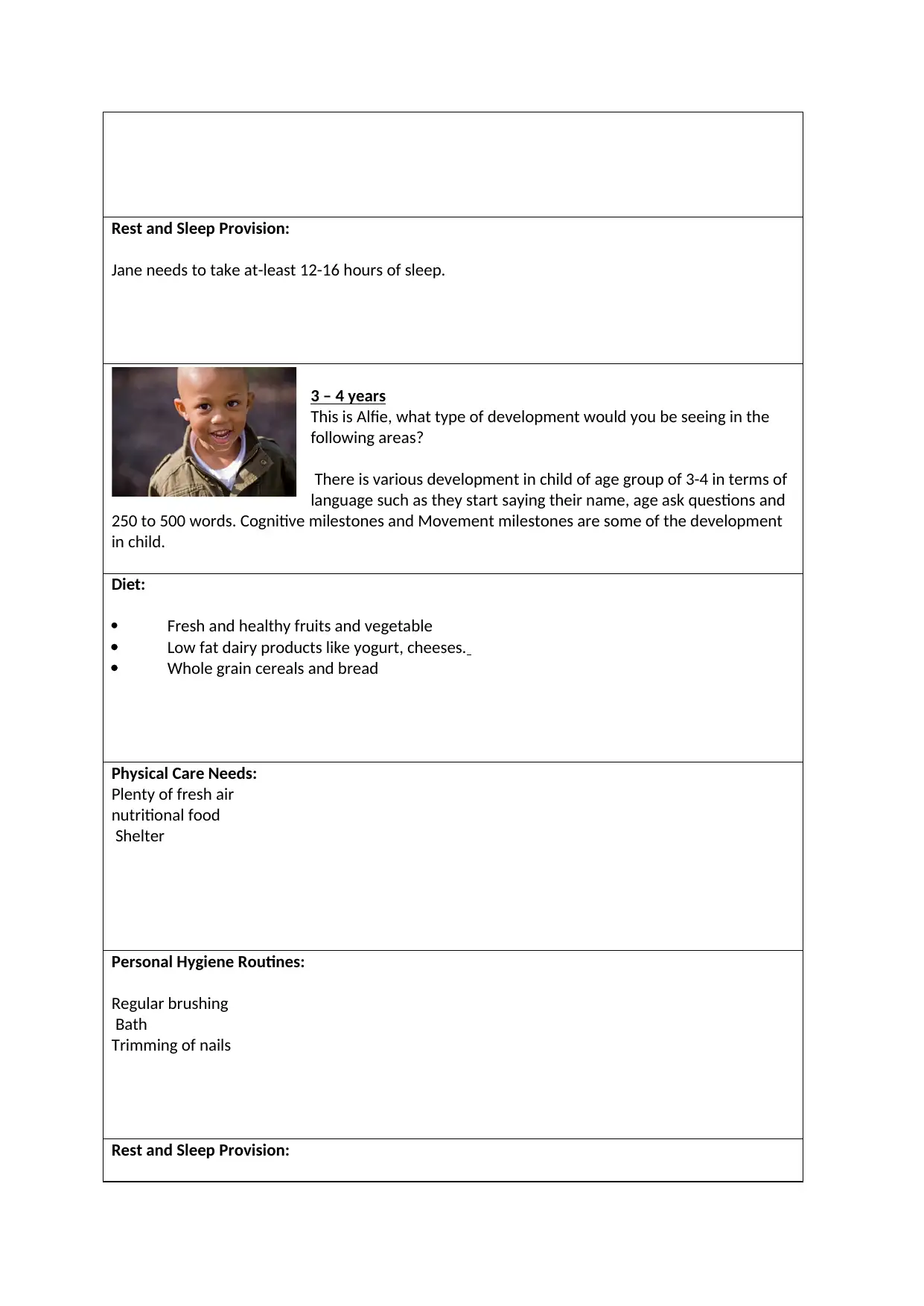
Rest and Sleep Provision:
Jane needs to take at-least 12-16 hours of sleep.
3 – 4 years
This is Alfie, what type of development would you be seeing in the
following areas?
There is various development in child of age group of 3-4 in terms of
language such as they start saying their name, age ask questions and
250 to 500 words. Cognitive milestones and Movement milestones are some of the development
in child.
Diet:
Fresh and healthy fruits and vegetable
Low fat dairy products like yogurt, cheeses.
Whole grain cereals and bread
Physical Care Needs:
Plenty of fresh air
nutritional food
Shelter
Personal Hygiene Routines:
Regular brushing
Bath
Trimming of nails
Rest and Sleep Provision:
Jane needs to take at-least 12-16 hours of sleep.
3 – 4 years
This is Alfie, what type of development would you be seeing in the
following areas?
There is various development in child of age group of 3-4 in terms of
language such as they start saying their name, age ask questions and
250 to 500 words. Cognitive milestones and Movement milestones are some of the development
in child.
Diet:
Fresh and healthy fruits and vegetable
Low fat dairy products like yogurt, cheeses.
Whole grain cereals and bread
Physical Care Needs:
Plenty of fresh air
nutritional food
Shelter
Personal Hygiene Routines:
Regular brushing
Bath
Trimming of nails
Rest and Sleep Provision:
⊘ This is a preview!⊘
Do you want full access?
Subscribe today to unlock all pages.

Trusted by 1+ million students worldwide
1 out of 17
Related Documents
Your All-in-One AI-Powered Toolkit for Academic Success.
+13062052269
info@desklib.com
Available 24*7 on WhatsApp / Email
![[object Object]](/_next/static/media/star-bottom.7253800d.svg)
Unlock your academic potential
Copyright © 2020–2025 A2Z Services. All Rights Reserved. Developed and managed by ZUCOL.





